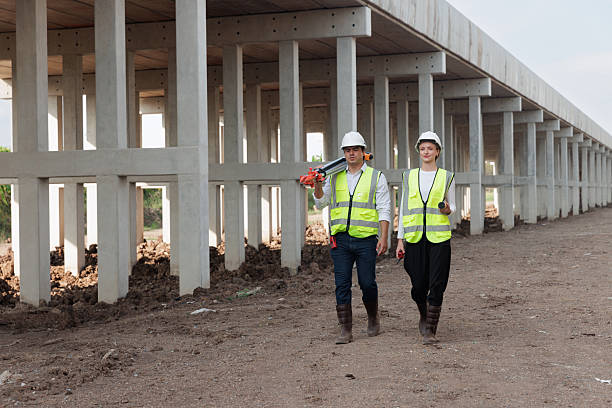The initial phase of a construction project is the groundworks, which prepare the site for building by clearing land, excavating, and laying foundations and underground utilities. These tasks are crucial to creating a stable base for a structure and ensuring that drainage, water pipes, and electrical cables are in place before any building begins, for a project’s structural integrity and to prevent future issues.
There are different types of groundworks for various construction projects to ensure successful, safe construction. You should know about the kinds of groundworks that provide structural stability, manage drainage, comply with regulations, and prevent costly problems in the future, from basic site clearance to complex foundations.
In this article, let’s explore the different types of groundworks and why it is important to know about these types.
What Are the Different Types of Groundworks?
Groundworks include a wide range of tasks, such as site clearance, excavation, trenching, and foundation construction, to prepare a site for construction. Other key types of Groundworks Guildford involve installing drainage and utility systems, building retaining walls, and performing landscaping and earthworks to stabilize slopes or create different topography. Let’s have a look in detail.
Site Clearance:
The groundwork process involves site clearance before construction begins. Site clearance means the removal of any prior debris on a site, including materials from previous constructions, plants and roots, soil, and any other hazardous waste. It is crucial to clear the site to ensure safety. To clear the site, machinery with a tilt-rotator attachment, such as hydraulic selector breakers, is used to speed up the process and make it safer to manage. Loading shovels are used for larger-scale projects to improve efficiency.
Sewer Construction:
Sewer construction is the process of building underground pipe networks to transport wastewater, stormwater, or industrial waste from buildings to treatment plants or disposal sites. This is the type of groundworks that is important for environmental protection, creating a functional and compliant waste-disposal system, and protecting the new building’s foundations. For creating a channel, sewer excavators are used. These channels transport wastewater away from homes and manage stormwater to prevent flooding and stagnation.
Foundations:
Foundations are the most important part of groundworks, providing a stable base for the rest of the structure. They provide structural stability by distributing a building’s weight to the soil, anchor the structure against forces like wind and earthquakes, protect against moisture and ground movement, and provide an even surface for the rest of the construction. A strong, well-built foundation is essential for the safety, durability, and longevity of any structure.
Trenching:
Trenching is the process of digging a narrow, deep excavation in the ground, primarily for installing or repairing underground utilities like pipes, cables, and drainage systems. This involves creating a cut that is significantly deeper than it is wide and is used in various construction projects, from residential plumbing to large-scale city infrastructure. Safety is a major concern, given the risk of cave-ins, so proper protective systems and inspections are required.
Landscaping:
In groundworks, landscaping refers to the process of transforming outdoor spaces through both hardscaping and soft-scaping. It is a crucial part of construction that involves site preparation, grading, drainage, and the final installation of both hard and soft elements to create functional and aesthetically pleasing areas.
Why Is It Important to Know About the Types of Groundworks?
Proper groundwork is the first step for any construction project and forms the foundation for the entire structure, which is critical for long-term success. Knowing the different types of groundworks is important because it ensures structural stability and ensures the project is completed safely and in compliance with regulations.
Let’s have a look at the key reasons to know about the types of groundworks.
· Proper groundwork provides the foundation to support a building’s weight and prevents future problems such as cracking, sinking, and structural failure.
· Correctly executed groundworks, especially proper drainage and stable foundations, prevent expensive and potentially dangerous issues down the line.
· Well-prepared ground, correct foundations, and effective drainage systems contribute to the longevity and stability of the structure over time.
· Knowing how to implement proper drainage systems is crucial for preventing future flooding and water damage to the structure and surrounding areas.
· Groundworks help create a more stable, accessible site for workers and machinery, improving efficiency and reducing the risk of accidents.
Conclusion:
In conclusion, groundworks are important for building a strong base for any construction project. Knowledge of different types of groundworks ensures a successful outcome that meets your needs and exceeds your expectations. Also, make sure you have the right Groundworks Contractors for constructing a building.





Comments